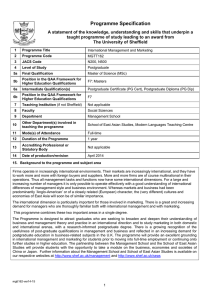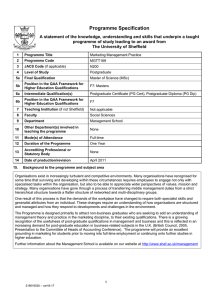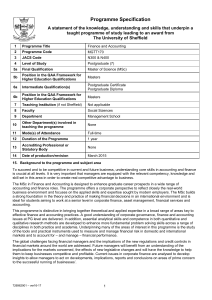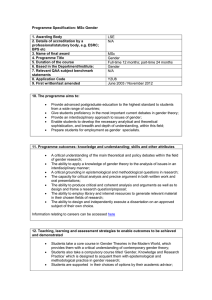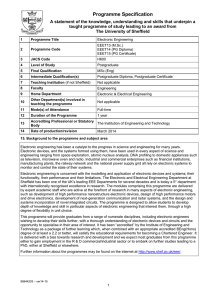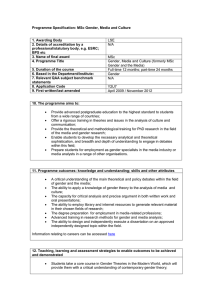1 Programme Title 2
advertisement
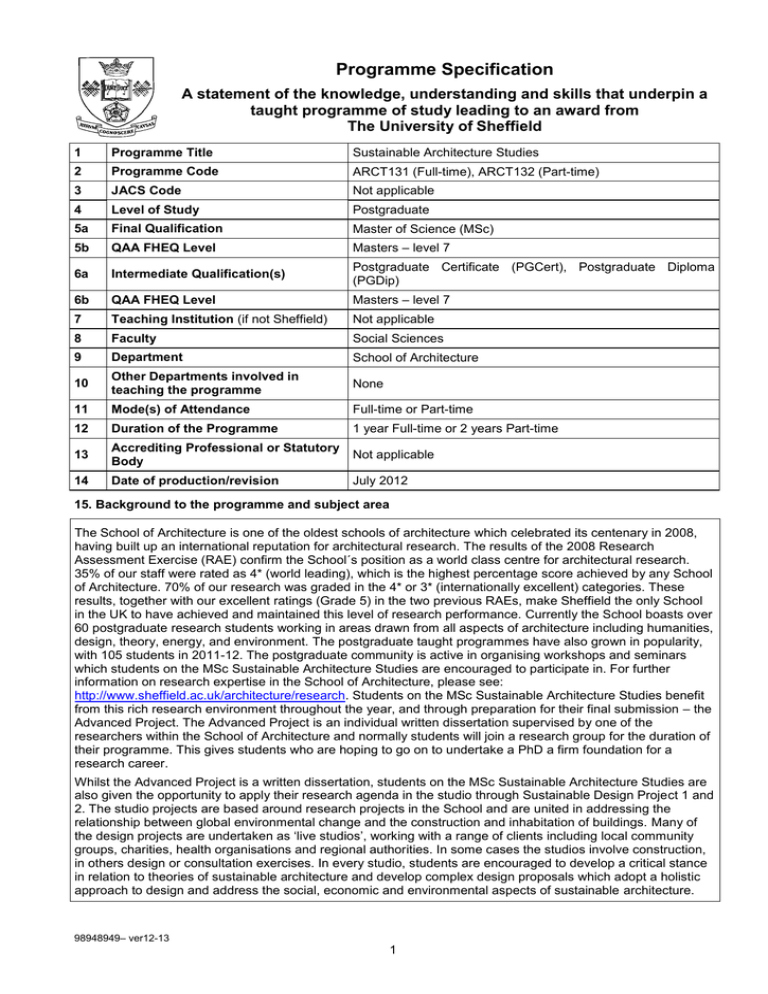
Programme Specification A statement of the knowledge, understanding and skills that underpin a taught programme of study leading to an award from The University of Sheffield 1 Programme Title Sustainable Architecture Studies 2 Programme Code ARCT131 (Full-time), ARCT132 (Part-time) 3 JACS Code Not applicable 4 Level of Study Postgraduate 5a Final Qualification Master of Science (MSc) 5b QAA FHEQ Level Masters – level 7 6a Intermediate Qualification(s) Postgraduate Certificate (PGCert), Postgraduate Diploma (PGDip) 6b QAA FHEQ Level Masters – level 7 7 Teaching Institution (if not Sheffield) Not applicable 8 Faculty Social Sciences 9 Department School of Architecture 10 Other Departments involved in teaching the programme None 11 Mode(s) of Attendance Full-time or Part-time 12 Duration of the Programme 1 year Full-time or 2 years Part-time 13 Accrediting Professional or Statutory Body Not applicable 14 Date of production/revision July 2012 15. Background to the programme and subject area The School of Architecture is one of the oldest schools of architecture which celebrated its centenary in 2008, having built up an international reputation for architectural research. The results of the 2008 Research Assessment Exercise (RAE) confirm the School´s position as a world class centre for architectural research. 35% of our staff were rated as 4* (world leading), which is the highest percentage score achieved by any School of Architecture. 70% of our research was graded in the 4* or 3* (internationally excellent) categories. These results, together with our excellent ratings (Grade 5) in the two previous RAEs, make Sheffield the only School in the UK to have achieved and maintained this level of research performance. Currently the School boasts over 60 postgraduate research students working in areas drawn from all aspects of architecture including humanities, design, theory, energy, and environment. The postgraduate taught programmes have also grown in popularity, with 105 students in 2011-12. The postgraduate community is active in organising workshops and seminars which students on the MSc Sustainable Architecture Studies are encouraged to participate in. For further information on research expertise in the School of Architecture, please see: http://www.sheffield.ac.uk/architecture/research. Students on the MSc Sustainable Architecture Studies benefit from this rich research environment throughout the year, and through preparation for their final submission – the Advanced Project. The Advanced Project is an individual written dissertation supervised by one of the researchers within the School of Architecture and normally students will join a research group for the duration of their programme. This gives students who are hoping to go on to undertake a PhD a firm foundation for a research career. Whilst the Advanced Project is a written dissertation, students on the MSc Sustainable Architecture Studies are also given the opportunity to apply their research agenda in the studio through Sustainable Design Project 1 and 2. The studio projects are based around research projects in the School and are united in addressing the relationship between global environmental change and the construction and inhabitation of buildings. Many of the design projects are undertaken as ‘live studios’, working with a range of clients including local community groups, charities, health organisations and regional authorities. In some cases the studios involve construction, in others design or consultation exercises. In every studio, students are encouraged to develop a critical stance in relation to theories of sustainable architecture and develop complex design proposals which adopt a holistic approach to design and address the social, economic and environmental aspects of sustainable architecture. 98948949– ver12-13 1 Besides training in research methods and design studio, students on the MSc Sustainable Architecture Studies also have the opportunity to specialise in subjects pertinent to the architectural profession in response to global environmental change and in which the School of Architecture possesses particular expertise. Currently there are three tracks open to students – Computational Design; Materials for Low Impact Building; and an open route. The programme (previously known as the M.Arch Studies in Sustainable Architecture) was established in 1992, revised in 1998 and updated in 2011 and 2012 to reflect shifts in sustainable architecture from a purely technological emphasis to a broader holistic approach which incorporates the School of Architecture’s ethos of promoting social responsibility. Many of the students on this programme have already worked in professional practice after completing four or five years of architectural training and recognise the benefits of studying at an advanced level within the School of Architecture. It should be noted that the programme is not designed to give exemption from professional examinations (such as those covered by the RIBA/ARB) which are covered by other courses within the School of Architecture. For further information on the MSc Sustainable Architecture Studies, please see: http://www.sheffield.ac.uk/architecture/study/pgschool/taught_masters/mscsas 16. Programme aims The MSc in Sustainable Architecture Studies aims to provide students with in depth understanding of the relationship between global environmental change and the built environment and equip them with the skills required for further academic research or careers in professional practice. The aims of the MSc Sustainable Architecture reflect the University of Sheffield’s six key objectives: achieving excellence, cultivating ambition, making a difference, working together, protecting the future, leading the way. Specifically it aims to: A 1. Develop research-led teaching in sustainable architecture studies. A 2. Inspire and enable our students to pursue innovative research and design in the field of sustainable architecture. A 3. Promote sustainable architecture within Sheffield and the region in order to encourage the transformation of the built environment for a more equitable future. A 4. Collaborate with local, national and global partners in order to enrich the learning experience for students. A 5. Operate in a sustainable manner. A 6. Provide a foundation for those seeking to go on to further research which may influence national and international research agendas and for those seeking to pursue leadership roles in the design of a sustainable built environment. 98948949– ver12-13 2 17. Programme learning outcomes Knowledge and understanding: Candidates for MSc, PG Dip and PG Cert will have developed: K1 A systematic understanding and knowledge of sustainable architecture, much of which is at the forefront of their academic discipline K2 A critical awareness of the relationship between global environmental change and the built environment K3 A critical awareness of new insights developed in the professional practice of sustainable architecture A comprehensive understanding of techniques for evaluating building performance and conducting K4 environmental simulation In addition, candidates for MSc or PG Dip will have developed: K5 Originality in the application of knowledge of sustainability in a design project K6 A conceptual understanding that enables the candidate to evaluate methods for the integration of renewable energy technologies with sustainable architecture K7 A conceptual understanding that enables the candidate to develop critiques of regulatory frameworks that govern the production of sustainable architecture and, where appropriate, to propose new policies or guidance In addition, candidates for MSc will have developed: K8 A practical understanding of how established techniques of research and enquiry are used in the field of sustainable architecture K9 A conceptual understanding that enables the candidate to evaluate critically current research and advanced scholarship in the field of sustainable architecture Skills and other attributes: Candidates for MSc, PG Dip and PG Cert will have developed: S1 An ability to advance their knowledge and understanding, and to develop new skills to a high level S2 An ability to communicate design decisions and research findings clearly to practitioners, academics and client groups S3 An ability to exercise initiative and take personal responsibility in group work S4 An ability to respond to a design brief with complex issues both systematically and creatively In addition, candidates for MSc or PG Dip will have developed: S5 An ability to make sound judgements in the absence of complete data S6 An ability to act autonomously in planning and implementing tasks at a professional or equivalent level S7 An ability to make decisions in complex and unpredictable situations S8 An ability to pursue independent learning required for continuing professional development In addition, candidates for MSc will have developed: S9 An ability to direct themselves and demonstrate originality in tackling and solving problems S10 An ability to plan, conduct and write-up an independent piece of primary research 18. Teaching, learning and assessment Development of the learning outcomes is promoted through the following teaching and learning methods: Lectures: Lectures will deliver the theoretical knowledge required for the programme. Every lecture is accompanied with a further reading and /or reference list to encourage students to develop their theoretical knowledge through independent study. Lectures are also linked to and / or supplemented by seminars. Seminars: Seminars will be based on lectures, workshops and field work; as well as critical readings of, and reflections on, key texts. Seminars are student-led group discussions with students presenting and discussing topics and issues arising in specific units. Workshops: Workshops will also deliver the theoretical knowledge required for the programme. Every workshop 98948949– ver12-13 3 is accompanied with a further reading and /or reference list to encourage students to develop their theoretical knowledge through independent study. Workshops are also linked to and / or supplemented by seminars. Design tutorials: Studio teaching will involve group and individual tutorials which provide formative feedback on the students’ progression with their design project. Field work: Field work relates directly to the studio-based design work and is used to develop the students’ analytical and evaluation knowledge and skills, enabling them to directly engage with a given site and context and to individually and collectively practice research methods, information management and communication techniques. Field work also enables students to develop skills in directly engaging with relevant stakeholders and local communities. Field work is used to gain both knowledge and awareness as well as to develop and test relevant skills. Design reviews: These sessions provide formative and summative feedback on the students’ work, often using peer review techniques that the School of Architecture has pioneered. They are open sessions with internal and external tutors and guests in attendance to offer advice and feedback. Independent study: Independent study is essential to the successful completion of this programme. In the design studio it has a central role in the design process, where students design proposals develop around issues identified during tutorials. For non-design units it is crucial for the completion of coursework. Dissertation supervision: Students are allocated a supervisor who will advise them on the process for undertaking their dissertation. Opportunities to demonstrate achievement of the learning outcomes are provided through the following assessment methods: Essay: Essays are used to evaluate understanding and knowledge presented in lectures, explored in seminars and developed through independent study. Debate: Debates are used to evaluate understanding and knowledge presented in lectures, explored in seminars and developed through independent study. Participation in a debate encourages students to engage with issues critically and to adopt a position which they may not fully agree with. Oral presentation: Oral presentations are seen as an important part of the assessment strategy. Students are required to present findings and recommendations to peers, outside professionals and members of staff, and such presentation is assessed. Oral presentations are used throughout the programme as a means of students presenting their work and reporting back to the programme or unit group. Poster presentation: Poster presentations are used as a means of assessment to test the ability of students to communicate the results of analysis, research and make recommendations in a graphical form. Portfolio review: A design portfolio of an architectural design or intervention which demonstrates the depth of understanding of sustainable architecture. The design or intervention will be presented in a portfolio which is expected to communicate the design through a range of media, which may include sketches, scale plans, sections, elevations, internal and external perspectives and a physical model. Reflective account: Reflective accounts provide a record of the design process in the form of a design journal. Technical report: Technical reports are used to evaluate understanding and knowledge presented in lectures, explored in seminars and developed through independent study. Dissertation: The dissertation is the culmination of the programme. Whilst it allows the expression of core and particularly specialist knowledge and skills to be demonstrated, it is not intended as an overall assessment for the whole programme. Instead the dissertation is intended to demonstrate particular understandings and skills. 19. Reference points The learning outcomes have been developed to reflect the following points of reference: QAA (2008). The framework for higher education qualifications in England, Wales and Northern Ireland. Gloucester, The Quality Assurance Agency for Higher Education. QAA (2010). Master's degrees characteristics. Gloucester, The Quality Assurance Agency for Higher Education. QAA ( 2010). Subject Benchmark Statement: Architecture. Gloucester, The Quality Assurance Agency for 98948949– ver12-13 4 Higher Education. (These are specifically for Part 1, Part 2 and Part 3 students on the professional route, therefore they have only been used to add value to the specifications for this postgraduate qualification). TuoS (2011). Global education in a Civic University: Learning and Teaching Strategy 2011-2016. Sheffield, University of Sheffield. SSoA (2012). The feedback handbook. Sheffield, School of Architecture, University of Sheffield. TuoS (2012). Strategic plan 2010-2015. Sheffield, University of Sheffield. Departmental activities: Learning and Teaching away days, programme reviews and previews, research interest of staff in the School of Architecture Feedback from external examiners The Royal Academy of Engineering (2012). The case for Centres of Excellence in sustainable building design. London, The Royal Academy of Engineering. EDUCATE (2012). Criteria for professional qualification: White paper, Environmental Design in University Curricula and Architectural Training in Europe. EDUCATE (2012). Sustainable architectural education: White paper, Environmental Design in University Curricula and Architectural Training in Europe. 20. Programme structure and regulations The MSc in Sustainable Architecture Studies (MSc SAS) provides a coherent programme that accommodates both part-time and full-time study. The Autumn and Spring semester units combine the delivery of core knowledge (45 credits), and knowledge and skills in a particular area of focus (30 credits), with two studio-based units (45 credits). The studio units build upon and integrate the skills and knowledge gained in other core areas of the programme. There is an increasing emphasis on individual learning as the programme develops, again allowing a personal emphasis to emerge, through the development of a research question and the dissertation itself (60 credits). The structure, excepting the dissertation unit, enables part-time students to begin and end the taught programme with a studio unit where all elements of the programme are synthesised. The MSc in Sustainable Architecture Studies is organised on a modular credit system. All modules are 15 credits apart from one taught module (Sustainable Design Project 2) which is 30 credits and the dissertation module which is 60 credits. This provides a flexibility that can respond to a variety of student needs. The MSc is awarded upon successful completion of five core modules (90 credits), two optional modules (30 credits) and the dissertation (60 credits). The total 180 credits may be completed in twelve months of full-time study (September – September). The MSc SAS is also available on a part-time basis, normally over a period of twenty-four months. The part-time route is designed to enable practitioners to join the programme for one to two days per week during the taught semesters. The Postgraduate Diploma in Sustainable Architecture Studies (PgDip SAS) is awarded upon successful completion of five core modules (90 credits) and two optional modules (30 credits). The Postgraduate Certificate in Sustainable Architecture Studies (PGCert SAS) is awarded upon successful completion of taught modules to the value of 60 credits. Detailed information about the structure of programmes, regulations concerning assessment and progression and descriptions of individual modules are published in the University Calendar available on-line at http://www.shef.ac.uk/govern/calendar/regs.html. 21. Student development over the course of study As a one year full-time/ two year part-time postgraduate programme, it is anticipated that students will enter the programme with an established set of skills. Relating to their disciplinary background, students will develop new skills and increase their specialist knowledge and skills in the first semester. There is an expectation that students will increase their emphasis on independent learning, culminating with the write up of the dissertation. Developmentally the programme progresses through a sequence of design problems and issues that gradually increase in complexity and scale. 98948949– ver12-13 5 22. Criteria for admission to the programme We welcome applicants from a range of academic and professional backgrounds. For entry to the programme applicants will need a first undergraduate degree (2.1 or above) or other equivalent qualification related to design in the built environment, including architecture, landscape architecture, town planning, chartered surveying and structural engineering, or another subject area where applicants can demonstrate a clear interest in sustainable architecture. Individuals with substantial professional experience in architecture, interior design, landscape design, town planning, surveying and construction will also be considered. Applicants with an existing design background are required to submit a design portfolio with examples of previous work and a written statement of interest in sustainable architecture. The portfolio should be no larger than A4, be a maximum of 10-20 pages including, where possible, projects that explore sustainability. Our preference is to receive this information electronically via the online application system in pdf format, although it is still possible to submit paper-based applications and send your portfolio (either on paper or CD) via the postal service. (Please note that unless adequate return postage is included, portfolios will not be sent back to applicants). Applicants with a non-design background are required to submit a written and illustrated statement of interest which outlines their previous experience and their interest in sustainable architecture. Applicants are also asked to provide two written academic references, a CV, and a transcript of previous university qualifications (including a certified translation where appropriate). English Language Requirements: For applicants whose first language is not English, or who have not gained previous academic qualifications with English as the main language, we ask the applicant to demonstrate satisfactory proficiency. Applicants are normally expected to have a qualification such as IELTS (or an equivalent) with a score of 7.0 (with no component less than 6.5). 23. Additional information This specification represents a concise statement about the main features of the programme and should be considered alongside other sources of information provided by the teaching department(s) and the University. In addition to programme specific information, further information about studying at The University of Sheffield can be accessed via our Student Services web site at http://www.shef.ac.uk/ssid. 98948949– ver12-13 6
